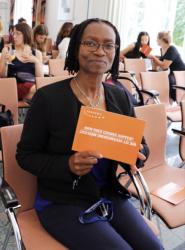
Following Professors Chandra Talpade Mohanty (2015) and Amina Mama (2018), Ann Phoenix has been appointed to the Angela Davis Visiting Professorship in 2021.

Professor of Psychosocial Studies at the Department of Education, University College, London (UCL). After studying philosophy, economics and psychology, she completed her PhD in 1991 with a study of mothers under 20. She went on to become a Senior Lecturer in Psychology at the Open University and Co-Director of the Thomas Coram Research Unit at the University of London before being appointed Professor of Psychosocial Studies at the Institute of Education, University College London. In 2014, Ann Phoenix was honoured with membership of the British Academy and the Academy of Social Sciences in recognition of her outstanding academic achievements. She was and is an internationally sought-after visiting professor. With her passion and commitment to critical, empirical, intersectional research and teaching, Ann Phoenix has inspired scholars and students worldwide.
When Black Lives Matter All Lives Will Matter
Under the title "When Black Lives Matter All Lives Will Matter", Ann Phoenix published a blog post together with UCL graduates in September 2020. The authors argue for engaging in difficult conversations, taking a stand against systemic racism, recognising the diversity of racisms and reflecting on what decolonisation means not only for education, but also for the state and society. They emphasise that conversations in which black voices are given space can bridge social differences. However, this requires effort and courage. In order to bring about sustainable change, universities would have to change fundamentally: in terms of students, employees and curricula. In short: in terms of the entire organisation.
Intersectionality research
Ann Phoenix is one of the most outstanding international academics in the field of intersectionality research. The connection between subjectivity and social structures is just as central to her work as the interweaving of the inequality dimensions of race, gender and class, which she expands to include other categories relevant to inequality. In numerous international research projects and an almost unmanageable number of publications, Ann Phoenix deals with the topics of motherhood and family, school and racism, childhood and youth, poverty and migration. The connection between intersectionality and black feminism is a recurring theme in her work.
For me, it is not possible to think about Black feminism without thinking about intersectionality. Black feminism was an inclusive project. It simply said: Look, we are also here in our diversity. But it also said: This is a way of thinking, a way of understanding the social world.
Childhood, poverty, migration
How children deal with challenging family relationships, poverty or relationships characterised by migration is one of the central research questions for Ann Phoenix. For example, she investigates children's 'language brokering' - children's translation skills that are associated with a shift in power positions and intergenerational relationships both within and outside the family. Another focus of her work lies in the area of gender socialisation, which she believes can only be understood intersectionally. Children learn from an early age that there are gender differences between black and white people. Experiences of racism characterise and permeate gender differences.
We are all always multiply localised. Although the different categories to which we belong are decentred, they also interlock, so that no one ever holds just one single gendered position, one single racialised position and so on.
School and Racism, Black Masculinities, Black Femininities
School and school education function as social place-markers, which is another reason why intersectional studies of everyday school life and its experience are central. Ann Phoenix's research on Black Masculinities shows that Black boys work their way through school interaction cultures and a recognisable student habitus, which has a negative impact on their school performance. Black girls, on the other hand, may perform better at school, but they are often devalued by (white) teachers because their femininity is measured against norms associated with whiteness. According to Ann Phoenix, education is structured by complex relations of inequality that distribute the possibilities and ideas of who we can become differently.
| Attachment | Size |
|---|---|
| 205.41 KB | |
| 813.05 KB |
